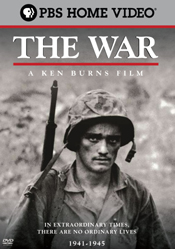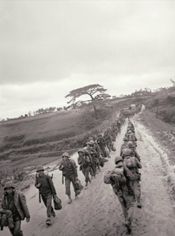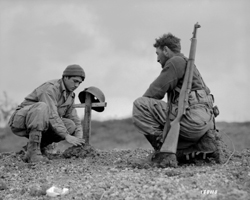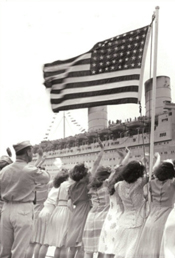Making movies. Enjoying movies. Remembering movies.
|
|
|
|
Related Articles:
|
Posted October 2, 2007 |
|
"The War" On DVD |
By
Bill Kallay

Ken Burns is no
doubt a passionate filmmaker and historian. His ambitious production, "The
War," is often maddening, sad, draining, hopeful, slow, exciting,
repetitious, spectacular, honest, cliche, and frustrating. In other words,
this is a series of films that will test your patience, yet often reward you
with some of the most honest appraisals of World War II put on film.
WWII has been forever ingrained in our collective conscience as "The Good
War." Newsreels and Hollywood sanitized this fierce and tragic time in
history. Many of our parents and grandparents who fought the war didn't talk
about it. At least many of the veterans I've meet or who have known rarely,
if ever, said a word about their experiences. It was the good fight. We
defeated the Nazis and Japanese. There were causalities on our side, but we
didn't often see the aftermath.
In this ambitious six part series, aired on PBS and now on DVD, Ken Burns
and co-director Lynn Novick guide viewers on a long journey into the war.
For the first time that I can recall, a documentary goes into the
frightening and terrible toll that war takes on soldiers and their families.
Besides modern films like "Saving Private Ryan" (1998) and the HBO series
"Band of Brothers" (2001), WWII has been a war seen through the eyes of
grainy film footage of planes being shot down, and people cheering in the
streets of Paris after the American forces take over. Not that the real
footage of the brutality of this war has never been seen. But Burns'
production uses it, almost to a fault, to underscore the losses our country
suffered. This is not a sanitized vision of WWII. We also see, through the
eyes of veterans and civilians, the war through their eyes.
 |
Covering approximately 15 hours running time, "The War" is difficult and
relentless, at times, to sit through part-by-part. What I can convey is that
this isn't a John Wayne movie with idealized battles and little blood loss.
It's not sentimental where as you cry on each song cue. This is a series
that sticks with you, despite its weaknesses. You come away drained, and
that's after watching the first few hours of it. Even though the series as a
whole runs at a brisk pace, the underlying tone that Burns and Novick set is
undeniably somber. Despite the last few minutes of the program highlighting
our win over the Nazis and Japan, one leaves this series sad and beaten.
The series is made up of modern interview footage, archival footage,
historic stills and audio, and maps to show how the war progressed. Burns
and Novick focus the war and its effects on four American cities and a
select group of people. They're from all walks of life, many religious and
economic classes, and some from Japanese-American, African-American,
Italian-American and Latin-American backgrounds. Indeed, the filmmakers take
the safe route and try and represent as many aspects of the war as possible.
It might be easy to criticize this approach, but I've rarely seen this done
before. It was refreshing to see that Japanese-Americans, as an example, are
given screen time for their own trials during the war. Taken to American
internment camps, Japanese-Americans were wrongly treated. The filmmakers
make an effort to point out that not only they made significant
contributions to the war, but other Americans of foreign ancestry did, too.
"The War" is completely gripping at times. The footage of battle almost
forces you to stare at the screen in horror. Burns and company poured
through hundreds of hours of WWII footage and stills to present this story.
They and their extensive crew deserve credit for vividly telling this story.
I've seen archival footage of the war numerous times, but I haven't seen it
put together like this.
Combining modern day interview footage with carefully selected film clips
and photographs, the filmmakers do an admirable job of telling the
survivor's stories. There is so much of the footage and so much of the
modern day interviews, that it's hard to pinpoint someone who stands out.
There is the story of the young man who enlisted because he felt unwanted by
the girl he loved. The story of Japanese-American soldiers who earned the
respect of their fellow troops, only after being saved by the "Japs," both
brings a smile and a grimace. There is the story of mothers who lost their
sons, and the story of a Marine fighter pilot whose photograph by a British
journalist inspired confidence that we would win the war.
Starting with the horrific attack on Pearl Harbor, the film's archival
footage seems to nearly cover every major battle of the war. The battles
themselves must have been as relentless as "The War" sometimes feels. Like a
drummer hitting you over the head, Burns and Novick continue to strike you
with footage of guns a blazing and the sight of carnage. You
become numb at seeing yet another major gun blasting away with modern day
sound effects. I felt as though the filmmakers were really trying to make
the point that this war wasn't a glorified "Life" magazine cover. The images
of the dead are disturbing and graphic.
 |
Both survivors and people who
stayed and kept the home front running are interviewed. The stories are told
with candor by people who could be our grandparents or parents. What struck
me was the fact of how young these people were when the war started. Many of
them were just out of high school. Who could imagine the horrors they and
their comrades-in-arms would encounter in battle after battle? Watching
these interviews, I could not help but to have even more respect for them.
Much of my own impression of the "Good War" came from vivid tales of bravery
and the ideals of being a soldier. A few years ago, my grandparents were
visiting from Ohio. They had two very good friends who lived out here on the
West Coast. One evening, my grandparents and their friends met at my
parent's house for coffee and dessert. I sat near my grandfather's friend,
Bob. I noticed him looking at a vintage Life magazine cover from 1944, the
year my dad was born. I glanced at it. "Incredible war," I must've
mentioned. I had always admired the sacrifices our soldiers made. "Did you
fight?" I asked. He nodded. He fought in Europe, as I recall. I smiled,
thinking I'd hear some great old time war stories. Instead, Bob's eyes grew
misty. "I fought over there. I lost a good many friends. Too many
friends." He sat there
silently with tears falling down his face. I didn't know what to say. Being
silent myself was the best thing I could do. I realized that WWII wasn't a
"Good War," nor was it a part of the idealized world of a Norman Rockwell
painting. The War was brutal, necessary and ugly.
The stories that have been handed down over the years by my teachers,
professors and family members tend to embellish the war. They speak of my
great-grandfather blowing up "Jap" bridges with hulking guns and rocket
launchers. They speak of how many people were killed on each side of the
battle line. They rarely, if ever, spoke of the human loss. Numbers of the
dead are one thing, but the emotional toll of a soldier is different. That's
where "The War" succeeds.
The stories from combat vets are moving and horrifying, tender and sincere.
I was glad to see that Burns and company focused on the human toll. Some of
the vets speak of their reaction to killing a man their age. This is
something that will stick with you as a viewer.
The series covers much, but sacrifices a lot of what could've been told. The
stories are told from an American perspective, and rightly so. That's what
the series is about. I thought that some of the series could've been
re-edited so we got a sense of who our enemies were. Hitler has been covered
over and over again in film, books and television. But in "The War," he's
barely seen, nor are the other ruthless dictators from Japan and Italy.
We're given more of a sense of the opposing ground forces as the enemy;
faceless and nameless bodies who fire at will. This may have been Burns'
agenda. I think he could have, and quite effectively, furnished history and
footage of why our enemies did what they did. To offer insight on what made
those callous and evil powers work might've made "The War" even more
effective.
 |
Burns' version of "The War" is long winded. With the horrors and constant
barrage of footage of the dead and wounded, you feel as though Burns is
re-working history to make his points. You feel Burns, despite the use of
graphic footage, tones down the war so that it is palatable. His use of big
band era music and slowly moving camera work on vintage stills somewhat
feels cliche and predictable. We've seen this way of filmmaking so many
times before, especially about WWII. You get that "Ken Burns Effect" ad
nauseam. Outside of the interviews, "The War" doesn't offer much that's new.
It was such a long and detailed war, it would take endless volumes to cover.
As Burns states in the beginning of "The War," "The Second World War was
fought in thousands of places, too many for any one accounting."
After watching "The War," I thought of my days in high school
when I tried digging through a 500+ page James Michener novel. Long and
difficult to read, the individual stories made opening the book worth
reading. I felt the same for Burns' latest film.
One comes away from "The War" with respect to Burns and Novick for directing
such a major endeavor. The series is outstanding, flawed, long,
and maddening at times. However, it is a brave attempt to chronicle history
and the stories of a generation. At the very least, it gives you a clearer
picture of what our vets went through.
"To the non-combatants and those on the periphery of action, the war
meant only boredom or occasional excitement. But to those who entered the
meat grinder itself, the war was a netherworld of horror from which escape
seemed less and less likely. As casualties mounted, then the fightin'
dragged on and on. Time had no meanin.' Life had no meanin.' The fierce
struggle eroded the veneer of civilization, and made savages of us all."
Eugene B. Sledge, U.S. Marine
The War
PBS Home Entertainment
Catalog Number 705212
Region 1
1.78:1 & 1.33:1
Dolby Digital 5.1
DVD Release Date: October 2, 2007
$129.99
TV-14
2007
15 hours
Color and Black & White
Directors: Ken Burns and Lynn Novick
Cast: Tom Hanks, Samuel L. Jackson and war veterans
Special thanks to Click Communications
IMAGES: © The American Lives II Film Project. All rights reserved.
